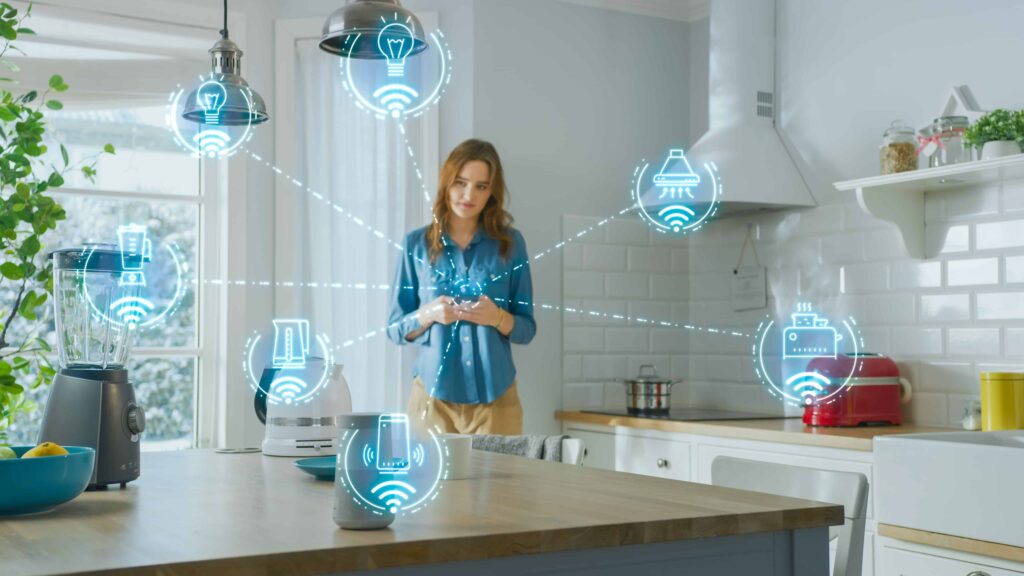
Artificial Intelligence (AI) aims to simplify human living through smart devices. These smart devices can adapt, improvise, and personalize user experience through their functioning and accessibility. These AI devices will replace existing devices and appliances with a smarter and more connected AI ecosystem.
Table of Contents
Why do we need AI in smart homes?
Convenience:
AI in smart homes can make users’ lives convenient by helping them with recurring and mundane everyday tasks. AI algorithms can be resourceful in recognizing and replicating patterns, allowing users to automate tasks easily.
Some real-life examples of AI for smart home convenience would be smart appliances operating independently based on set schedules and usage patterns. Another example of AI for convenience is AI voice assistants. AI can help us save effort and time that we can better invest somewhere else.
Sustainability:
Even with best practices, we can consume more than the required energy. Waste of energy can also take place unknowingly, whether due to energy consumption from old appliances or human error. In either case, AI can help us become more sustainable using self-regulating and low-power devices like Smart lights, Smart Thermostats, Smart Plugs etc.
Personalization:
Personalization is one of the significant breakthroughs of AI in smart homes. It can help users make the most of their smart devices as they adapt and operate as per users’ preferences and habits. Imagine an HVAC system that can learn and operate as per your preferences- that’s how AI can bring personalization.
Health & Wellness:
Health and wellness are at the heart of improving everyday life. AI can help us equip smart devices such as water quality meters, air quality meters, structural health monitors, and even smarter alarms within our homes. AI can also present solutions to cope with our sedentary lifestyle.
Security:
AI can upgrade home security with smart locks, cameras, intrusion detectors, and threat recognition solutions. These devices can replace traditional security cameras with far more cognitive and intelligent security solutions against potential security threats.
AI can transform all these areas with the help of technological advancements into smart devices, sensors, IoT gateways, hardware computation, and firmware upgrades. Next, we will cover some of the applications in-depth to realize the impact of AI in smart homes
Application of AI in Smart Home
Voice Assistants and Natural Language Processing in Smart Homes
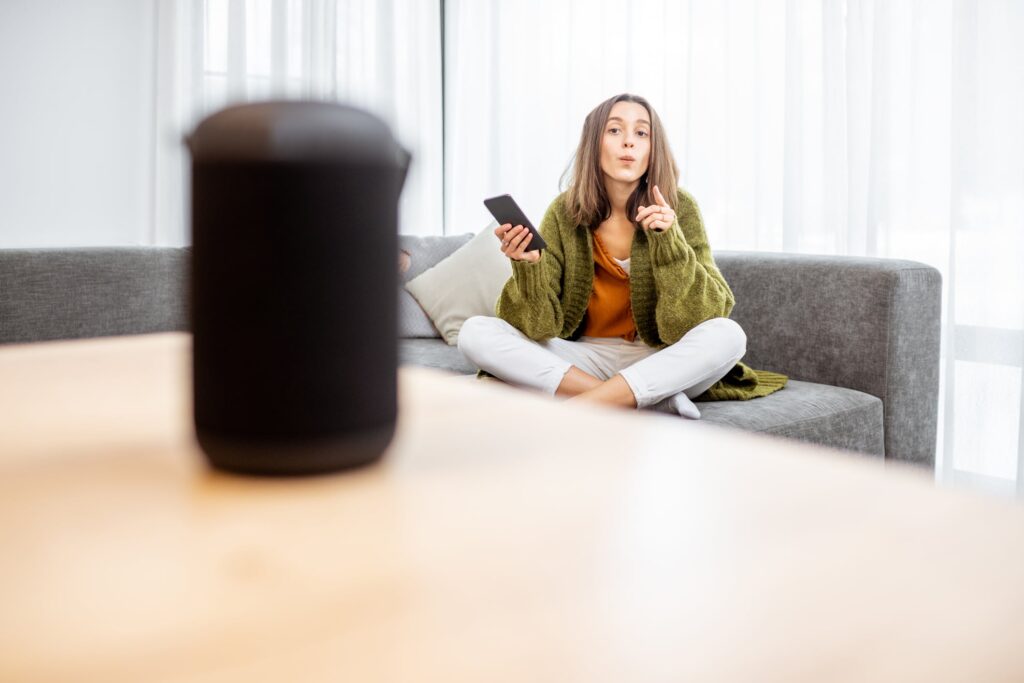
AI voice assistants are the most popular consumer use of AI worldwide. In smart homes, AI assistants can execute various tasks, control appliances, and fetch information on the user’s voice commands. It is among the most intuitive and easy ways for users to control their devices.
These AI voice assistants are built upon the software’s computational ability to recognize and process natural voice commands. This ability of AI to comprehend human voice statements is called Natural Language Processing (NLP). NLP and Machine Learning can help improve the understanding of virtual assistants over time to serve smart home applications better.
Here are the several ways through which AI voice assistants can serve smart homes:
Personal assistants:
AI-based voice assistants can be your helping hand to help you with your tasks and calls. Some functions that AI personal assistants can perform are managing schedules, creating a to-do list, operating apps, and setting reminders.
Some of these assistants can even find answers, search for facts, send short messages, and even make phone calls on your behalf. Allowing users to give focus on the task at hand.
Home automation & control:
AI voice assistants can connect with M2M devices in your home through the internet or local wireless connectivity to control them. It allows users to control their devices just through voice instructions. Such voice assistants can help easily control lights, HVAC, doors, and other appliances.
Audio inputs allow users to control and schedule their appliances for better user experience and comfort. Over time, smart home appliances can perform different functions through verbal commands using NLP and ML abilities.
Infotainment assistance:
AI voice assistants can act as a go-to device for users to access the internet for information, media, and entertainment. At the user’s command, these voice assistants can play media such as any music from their subscription services. Users can also instruct these assistants to play media on a particular device.
Besides the media, these assistants can fetch information such as sports scores, flight recommendations, finding restaurants, traffic congestion, best routes, and weather predictions at your command.
Smart Home Energy Optimization with AI
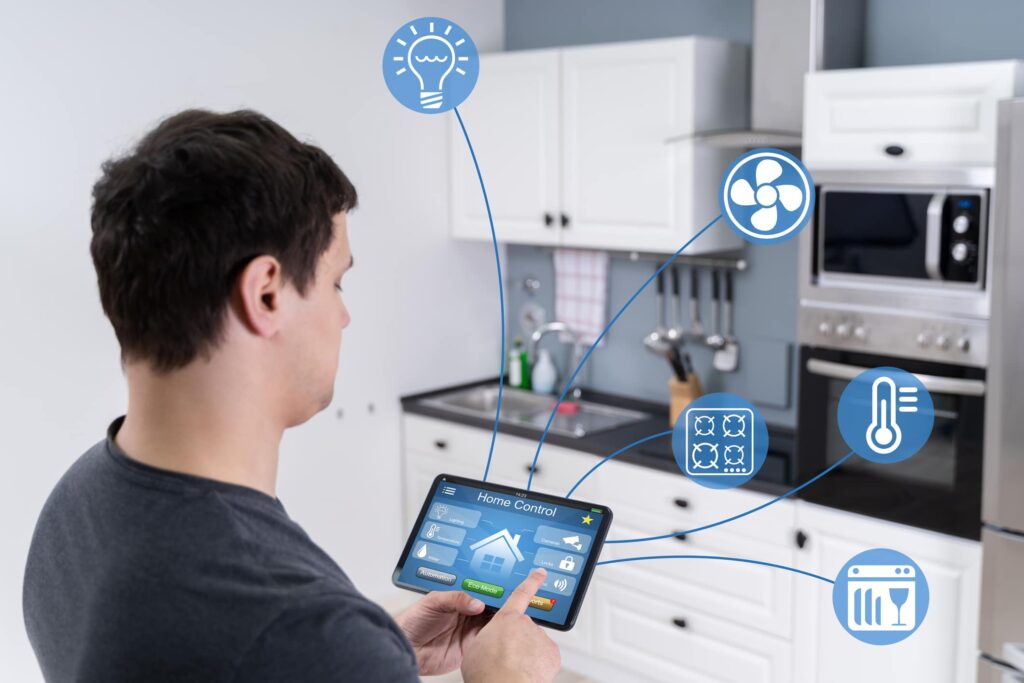
Energy optimization is a need of the hour, whether it is to save money or to make the world sustainable. Smart homes will leverage AI to be energy efficient and give more significant results to a sustainable ecosystem. Here are some examples of AI for smart home energy optimization:
Energy consumption monitoring:
With the help of AI-based devices, we can keep a closer watch on energy consumption in our homes. These AI sensors can collect power consumption information through different devices at different hours. Smart energy meters can ensure users get a complete outlook on using energy.
Energy consumption insights:
AI can also help analyze energy consumption data to understand energy usage better. AI can understand any energy consumption patterns through different times or different appliances. Such insights into energy consumption can help you identify any room for optimization and improvement.
Smarter energy control:
AI devices can identify usage patterns to understand when there is a need to go to sleep mode when they are inactive. Such energy optimization is the key behind low-power devices that we use in our everyday lives. The same principle can also help with smart lighting and smart HVAC that can operate based on human presence only when necessary.
AI energy efficiency recommendations:
AI energy efficiency recommendations allow users to be aware of their power consumption habits with the help of AI. It also suggests a different approach to efficiently using appliances. AI can also use predictive maintenance to understand if an object is consuming power irregularly.
AI-powered Security Systems for Smart Homes
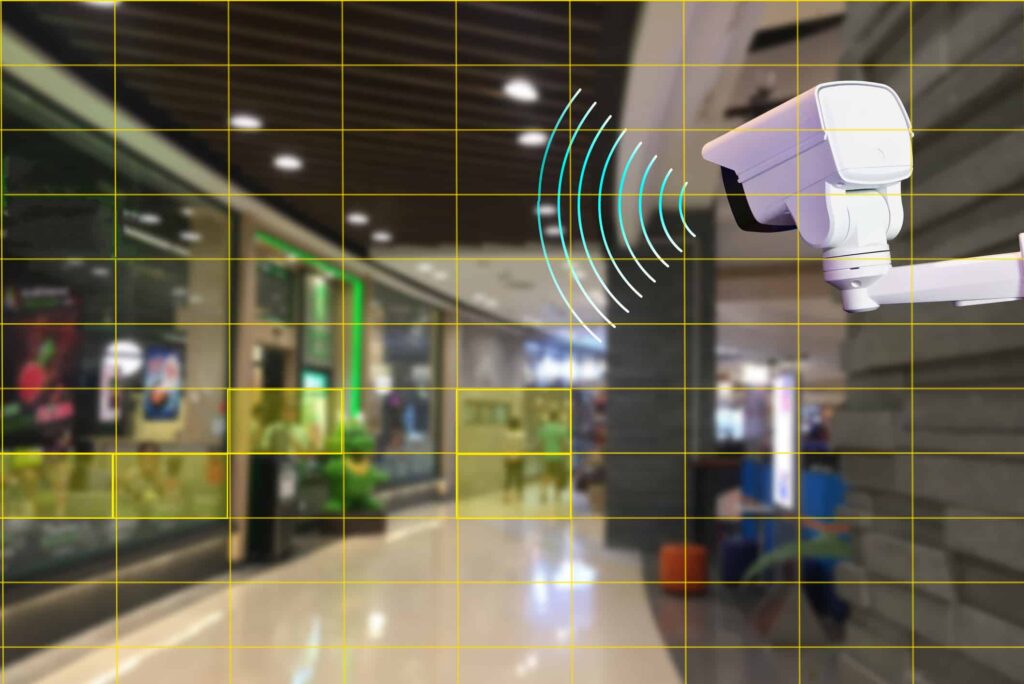
AI can make security systems smarter to create a safer and more secure environment at home. The novel use of AI, such as Computer Vision, Facial Recognition, and Intent Understanding, can help users efficiently prepare for any security threat.
AI-powered security solutions can be versatile, from facial recognition to behavioral analysis. Here are some of the popular AI security systems for smart homes:
Facial recognition solution:
Facial recognition is a game-changer for smart home security cameras as it can enable cameras with other functional abilities to secure our homes better. Facial recognition can identify any visitor and notify them for better access control. It can also keep a time log for any entries and exits to verify the presence of any residents.
AI intrusion detection:
AI video monitoring and edge processing can allow a homeowner to process the real-time surroundings of their home. This would allow them to detect any human/animal/object in the periphery. Such detection will process the unusual behavior of the visitor; it can help detect intrusion and alarm the homeowner in real-time.
Voice-authentication:
AI technology can also allow smart home security solutions to detect and identify the voice of any visitor. Such voice authentication can help automate the access control for known visitors while logging any attempt to enter the home. Voice authentication can be a cheaper and simpler alternative compared to face recognition.
Smart home security alerts:
AI smart home security devices can allow homeowners to keep a close watch on their houses even in their absence. AI security apps enable users to remotely monitor their homes’ surroundings and notify them of every activity, including door access, window access, and even fire/smoke detections.
AI Cyber security for smart home devices:
Smart homes will be built upon smart home devices and sensors. These devices may all be connected locally or to the internet. In that case, protecting these devices against any cybersecurity threats is crucial. AI solutions can monitor the network and detect any vulnerabilities needing attention.
AI will help us live in smarter, safer homes. It will be the key to reducing any such intrusions or theft.
Personalized Experiences in Smart Homes with AI
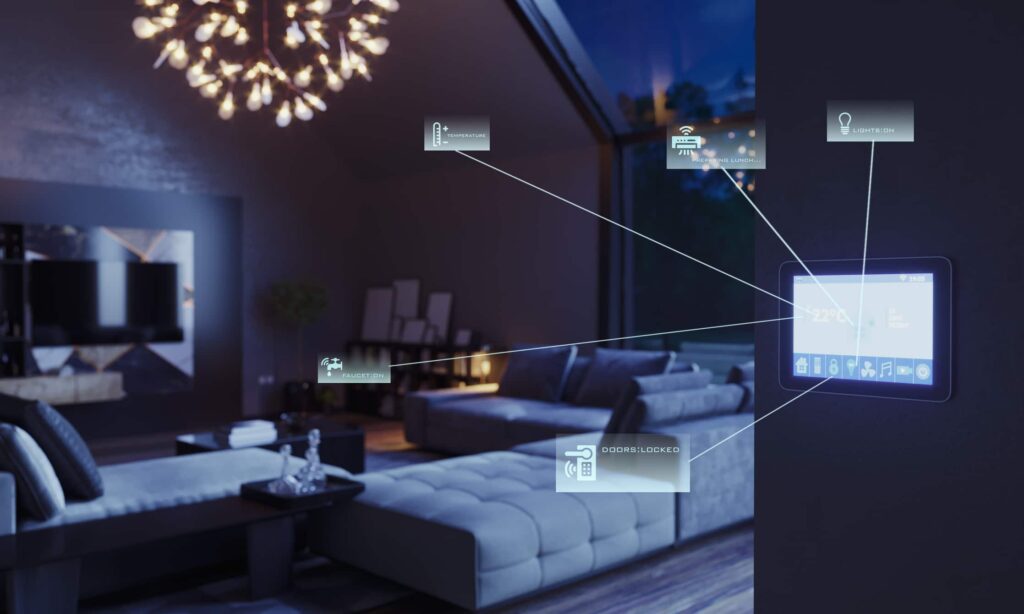
Artificial Intelligence and Machine Learning algorithms can help create a personal experience for our smart home systems. It can tailor our expertise as per our habits and lifestyle as given below:
Personal preferences:
Artificial Intelligence can collect information from each user about their preferences and patterns. This information can then help AI to control and set appliances to function in a custom manner. Artificial Intelligence can set appliances to your favorite settings by adjusting thermostats or air conditioners to your preferences.
Contextual AI:
To create a personal experience, AI must understand and analyze contextual information about the user. Analyzing information from sources like calendar, temperature, lighting, and room occupancy will allow AI to control smart home devices and create the ideal experience for the user.
Voice commands:
AI voice assistants with Natural Language Processing can allow individuals to set their voice commands to control different smart home devices. AI assistants can also personalize their responses to different voice instructions based on personal preferences, information, and services.
Adaptive AI:
Adaptive AI refers to Machine Learning’s ability to continuously encounter changes, habits, and preferences to learn and adapt. Through such learning, Artificial Intelligence helps serve individuals as per their unique needs and behavior prediction.
Human activity recognition:
We require a unique atmosphere for different day-to-day activities. We change lighting, music, or temperature for different things at home. AI can recognize the activities we perform and adjust our surroundings accordingly. Such activity recognition helps create a smart kitchen, exercise, and meditation experience in our homes.
AI-driven Data Analytics in Smart Homes
Data is the key to learning, improving, and performing Artificial Intelligence. Data analytics is a functionality that helps process data from smart home devices. Data analytics is used to find any recurring patterns in the data. In the case of a smart home, Data Analytics is a fundamental step to improve AI for smarter operations, control, and personalization.
Data Analytics driven Artificial Intelligence can offer extensive insights about our homes and everything surrounding them. Let’s take a look at how Data Analytics can uncover insights and patterns for us:
Collecting Data:
A smart home leverages AI devices and sensors to gather data about the surroundings. These real-time data from sensors can help analyze and derive conclusive AI outputs. It will capture occupancy, appliance usage, access controls, and other data.
Data filtering & data quality:
It is essential to filter the collected data before analyzing it. Data quality has different variables, such as sensor accuracy and consistency. Filtering inaccurate data can help AI be precise in its operations. These are the few things that can help avoid any malfunctioning in an AI smart home.
Data processing:
Data processing can further analyze good-quality data to dive deeper and gain an understanding of user patterns and access. AI can transform the raw data into a conclusive set of actions through mathematical and statistical methods.
AI predictions:
Data analytics can use predictive analysis with the help of past data to derive predictable outcomes. AI prediction in a smart home can help predict users’ preferences and needs to create a better smart home experience. AI can even predict appliance usage, energy consumption, personal preferences, maintenance, etc.
Data Visualization:
Data visualization is the last step of Data Analytics, allowing smart home users to review the insights visually. From usage patterns to logs, Data Visualization can present
Data Analytics and AI can allow users to elevate their smart home experience while providing deeper insights into their living patterns and preferences. AI can help smart homes in every aspect of living, from better efficiency to a secure & productive environment.
Future Perspectives of AI in Smart Homes
It is safe to assume that the involvement of AI in smart homes is here to stay. From the growth so far, we hope that AI will grow to create more value for our smart homes. Some of these future ideas include:
- Further personalization for every home resident with minimum manual setup and effort.
- Robotic arms and IoT appliances in smart kitchens to help simplify cooking in smart homes.
- Sustainable energy management ensures efficient energy consumption beyond anything we have seen.
- Emotional Intelligence with AI will be a game-changer as it will also account for the emotions of smart homeowners and will be able to provide many relevant outputs in any area of its operation.
- A mix of Artificial Intelligence, Augmented Reality, and VR will create a unique out-of-the-world experience for smart homeowners who can transform their homes into their paradise without physical limitations.

